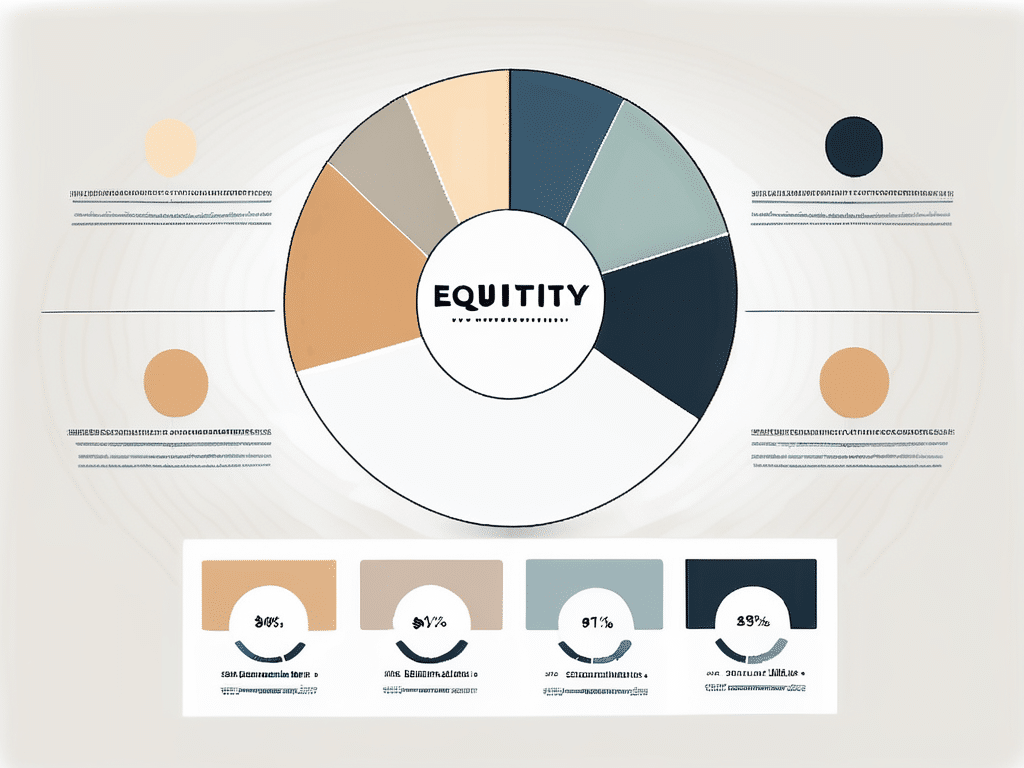Starting a startup is an exciting venture, but one of the most crucial decisions entrepreneurs need to make is how to divide equity. Equity refers to the ownership stake that individuals hold in the company. It determines how the profits and losses are shared among founders, investors, and employees. In this ultimate guide, we will explore the various aspects of dividing equity in a startup, including the importance of equity, key factors to consider, common methods for dividing equity, legal aspects, and mistakes to avoid. So let’s dive in and understand equity in a startup.
Understanding Equity in a Startup
Equity in a startup refers to the ownership interest of individuals in the company. It represents their share of the business’s assets and future profitability. Dividing equity fairly is essential for maintaining a motivated and committed team, attracting investors, and ensuring the long-term success of the startup. To grasp the concept of equity, it’s crucial to define it and understand its importance.

When considering equity in a startup, it’s important to delve into the various types of equity structures that can be implemented. Common forms include founder’s equity, which is the ownership stake held by the original founders of the startup, and employee stock options, which are incentives offered to employees to align their interests with the company’s success. Understanding these structures can help in creating a comprehensive equity distribution plan that benefits all stakeholders involved.
Defining Equity
Equity is the residual interest in the assets of a startup after deducting liabilities. It represents the value that is split among the founders, investors, and employees. Equity is typically issued in the form of shares, which entitle the holders to certain rights, such as voting rights and the right to receive dividends. Dividing equity fairly ensures that everyone involved has a stake in the company’s success and aligns their interests with its long-term goals.
Furthermore, equity can also be categorized into preferred and common stock, each carrying different rights and privileges. Preferred stockholders, for example, have priority over common stockholders when it comes to receiving dividends or assets in the event of liquidation. Understanding these distinctions is vital in structuring equity agreements and maintaining transparency within the startup.
Importance of Equity in a Startup
Equity plays a crucial role in the success and growth of a startup. It motivates founders and employees to work hard and contribute their time and experience to the company. Additionally, it serves as an incentive for investors to provide funding and support for the startup. Fairly dividing equity fosters a sense of ownership and responsibility, creating a strong foundation for the startup’s future.
Moreover, equity ownership can also impact decision-making processes within the startup. The distribution of equity among stakeholders can influence voting rights and governance structures, shaping how key strategic choices are made. By understanding the implications of equity on governance, startups can establish a framework that promotes collaboration and effective leadership, driving the company towards its objectives.
Key Factors to Consider Before Dividing Equity
Before diving into the methods for dividing equity, it’s essential to consider several key factors that can greatly impact the decision-making process.

Dividing equity in a startup is a crucial step that can shape the future of the company and its team. It’s not just about splitting ownership but also about aligning incentives, recognizing contributions, and fostering a sense of ownership among team members. Taking the time to thoughtfully consider the following factors can lead to a more successful and harmonious equity distribution.
Assessing the Value of Each Role
When dividing equity, it’s crucial to assess the value that each role brings to the startup. Founders should evaluate the specific skills, experience, and contributions of each team member. Roles that are critical to the startup’s success and require unique experience may warrant a higher equity stake. Fairly assessing the value of each role sets the foundation for an equitable division of equity.
Moreover, considering the potential growth trajectory of the startup and the scalability of each role can provide insights into the long-term value that each team member brings. Roles that have the potential to significantly impact the company’s growth and success should be reflected in the equity distribution.
Considering Future Contributions
Equity distribution should also take into account the future contributions of individuals. As the startup grows and evolves, new team members may join, and existing members may take on additional responsibilities. Planning for future contributions ensures that equity is allocated accordingly and prevents potential disputes down the line.
Furthermore, creating a framework for revisiting and adjusting equity allocations based on ongoing contributions and performance can help maintain a fair and motivating distribution structure. Acknowledging that roles and responsibilities may shift over time allows for a more dynamic and responsive approach to equity division.
Evaluating Risk and Commitment
Startup ventures involve risks, and the level of commitment from individuals may vary. Some founders may have invested significant financial resources, while others may contribute their time and experience. Evaluating the risk and commitment of each team member helps determine a fair division of equity.
Recognizing the sacrifices and dedication of team members, especially in the early stages of a startup, can influence the equity split. Understanding the personal and professional risks taken by each individual and their long-term commitment to the company’s success can guide founders in making equitable decisions regarding ownership stakes.
Common Methods for Dividing Startup Equity
Now that we have examined the key factors to consider, let’s explore some common methods for dividing startup equity. These methods provide a structured approach to ensure a fair and transparent division.

Equal Split
The equal split method is straightforward and involves dividing the equity equally among all founders or participants. This method assumes that all individuals contribute equally to the startup’s success and believe in an egalitarian distribution of ownership. The equal split method is suitable when there are no significant differences in roles, contributions, or risk among the team members.
Imagine a scenario where a group of friends decides to start a tech company together. They all have similar skill sets, share the same vision, and are equally invested in the success of the startup. In this case, an equal split of equity would be a logical choice. It fosters a sense of equality and ensures that everyone has an equal stake in the company’s growth and prosperity.
Role-Based Split
The role-based split method considers the value and importance of each role in the startup. Founders allocate equity based on the level of responsibility, experience, and contribution required for each position. Roles with greater impact on the company’s success receive a higher equity stake. The role-based split method acknowledges the varying levels of commitment and experience among team members.
Let’s say a startup is founded by a team consisting of a technical professional, a marketing guru, and a seasoned business strategist. Each member brings a unique set of skills and experiences to the table. The technical professional, responsible for developing the product, holds a crucial role that directly impacts the startup’s success. Therefore, they might receive a higher equity stake compared to the marketing guru or the business strategist. This method ensures that equity distribution aligns with the significance of each role and recognizes the varying contributions made by team members.
Dynamic Equity Split
The dynamic equity split method takes into account the changing dynamics of the startup over time. It allocates an initial equity percentage based on the agreed-upon factors, such as roles, contributions, and risk. However, as the startup progresses and individuals continue to contribute, the equity allocation can be adjusted periodically to reflect their ongoing involvement. The dynamic equity split method allows for flexibility and keeps the equity distribution aligned with the changing needs of the startup.
In the early stages of a startup, it can be challenging to predict the exact contributions and impact each team member will have in the long run. The dynamic equity split method addresses this uncertainty by allowing adjustments to be made as the startup evolves. For example, if a team member initially had a smaller equity stake but later proves to be instrumental in securing a major funding round, their equity allocation can be revised to reflect their increased value to the company. This method ensures that equity distribution remains fair and reflects the ongoing efforts and contributions of each team member.
Legal Aspects of Dividing Equity
When dividing equity in a startup, it is essential to consider the legal aspects to ensure a smooth and transparent process.
Equity Agreements
Equity agreements are legal documents that outline the terms and conditions of equity distribution. These agreements include details such as the total equity percentage, vesting schedules, buyback provisions, and any restrictions on transfer or sale of equity. It is important for founders and team members to consult with a legal professional when drafting equity agreements to protect their rights and avoid potential conflicts in the future.
Legal Implications and Responsibilities
Dividing equity involves legal implications and responsibilities for both founders and participants. It is crucial to comply with applicable laws and regulations regarding equity allocation and shareholder rights. Founders and participants should familiarize themselves with the legal aspects and consult legal professionals to ensure compliance and mitigate any potential legal risks.
Mistakes to Avoid When Dividing Equity
While understanding how to divide equity is crucial, it is equally important to be aware of the common mistakes that entrepreneurs should avoid.
Avoiding Over-Generosity
One common mistake when dividing equity is being overly generous, particularly with early-stage employees or advisors. Allocating too much equity without considering the long-term implications can dilute the founder’s stake and diminish investor confidence. It is important to strike a balance between rewarding contributions and preserving the startup’s equity value.
Ignoring Future Investment Needs
Another mistake is ignoring the startup’s future investment needs when dividing equity. As the startup grows and requires additional funding, there may be a need to attract new investors and offer them equity. Ignoring this aspect during the initial division of equity can lead to complications and potentially hinder future fundraising efforts. Founders should consider the potential dilution and keep a portion of equity reserved for future investments.
Dividing equity in a startup is a critical decision that requires careful consideration. By understanding the importance of equity, evaluating key factors, utilizing common methods, addressing legal aspects, and avoiding common mistakes, entrepreneurs can establish a fair and transparent equity distribution. A well-divided equity structure lays the foundation for a motivated team, investor confidence, and long-term success


